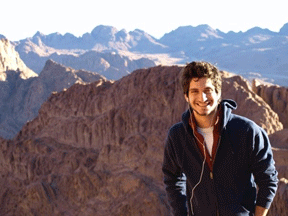For Sam Adelsberg, C’10, the Israeli-Palestinian conflict has always been more than just an intellectual interest. “I come from an Orthodox Jewish family,” he says, “one where, from the womb, Israel was always discussed and where the conflict was always present.” Although he had long known that he wanted to make an impact on the region, until he came to Penn, he couldn’t have imagined the cultural, religious and political boundaries he’d cross to fulfill this mission.
Adelsberg, along with rising Wharton senior Andrew Dudum, College alumnus David Fraga, and Penn Law alumnus Allam Taj, founded LendforPeace.org (LFP), a not-for-profit Internet platform, launched in February 2009, which allows people from around the world to make small loans directly to micro-entrepreneurs in the West Bank. Working with U.S. government-approved microfinance institutions on the ground in the region, the organization delivers loans from private individuals to vetted and approved low-income borrowers who are interested in starting or expanding their own small businesses. The loans are repaid over a set period of time, and so far LFP has seen a 100 percent repayment rate.
“We’re trying to chart out a third path for how to approach this conflict, particularly as part of the diaspora communities related to it.” – Sam Adelsberg
Adelsberg developed the idea for LFP while pursuing his double major in Philosophy, Politics and Economics and Modern Middle East Studies. While he recognized the complex national, historic and religious issues that were perpetuating the conflict, he also began to see that there were economic issues in play—and that they were often overlooked.
“I started thinking about how I, a 21-year-old college student, could make my impact in the economic realm, and microlending was the obvious option,” Adelsberg says. “It’s transparent in a region that’s historically not transparent; it’s bottom-up in a region where things are generally top-down; and it’s a way to connect people everywhere with vetted and deserving borrowers on the ground.”
With funding from the Clinton Global Initiative and the Davis Projects for Peace (administered at Penn by the Center for Undergraduate Research and Fellowships), Adelsberg and his co-founders—one Jewish and two Palestinian—worked day and night to launch the site. All four are personally invested project. “We are deeply impacted by the conflict and have many disagreements,” he says, “but we chose to focus on what we agree about to be a catalyst for conflict resolution. We’re trying to chart out a third path for how to approach this conflict, particularly as part of the diaspora communities related to it.”
Not everyone in Adelsberg’s network of family and friends has been accepting of his willingness to work across religious and political divisions. “There are always people who are going to disagree with work like this because they view the conflict as a zero-sum game,” Adelsberg says. “If they win we lose; if we win they lose.”
At Penn, Adelsberg has determinedly pursued a range of academic and extra-curricular experiences with the purpose of transcending this either/or perspective. He has studied abroad in Egypt; co-chaired the University’s interfaith student group; and completed thesis research on how Islam, Judaism and Christianity have historically conceptualized interest-based lending.
“My family has its narrative,” Adelsberg says. “My grandparents were Holocaust survivors, and for them the state of Israel is the most important thing. But I’ve come to see that there are other families that have their own narratives, and I need to recognize those narratives for their humanity and for their reality.”



